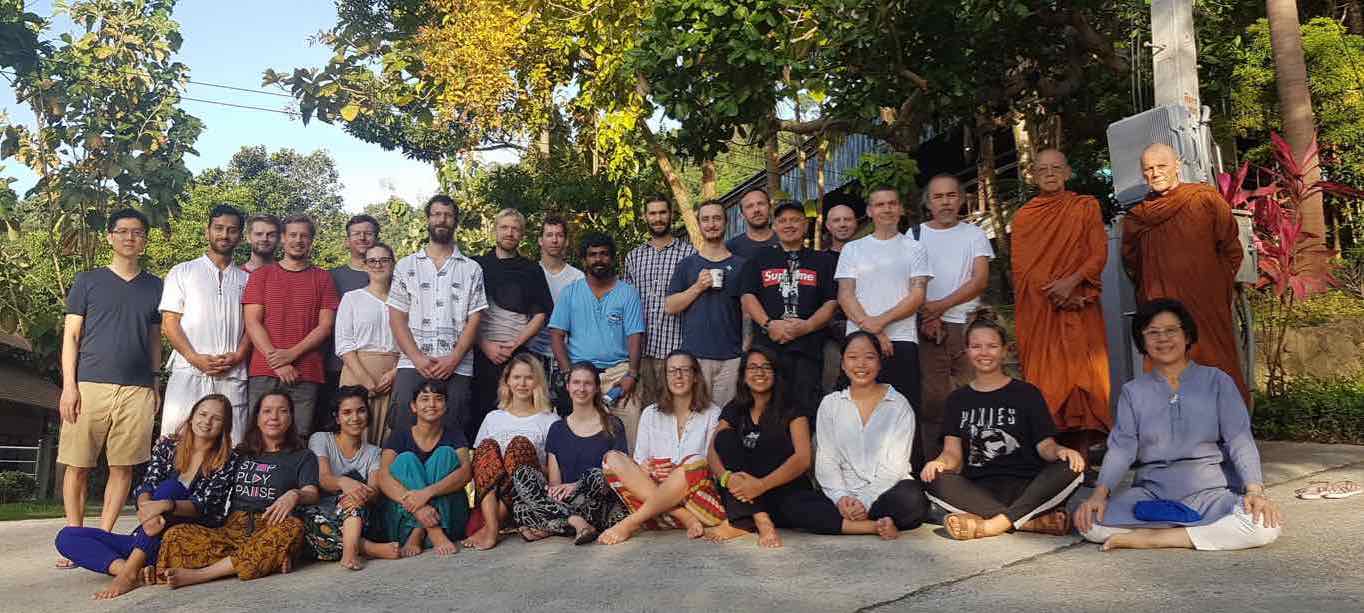Meditation Retreat at Dipabhāvan
After a good retreat at Suan Mokkh in 2017, I decided to give their affiliated center on Koh Samui a try this year. Dipabhāvan turned out to be an even nicer place to practice than Suan Mokkh.

The rundown
Retreats at Dipibhāvan are only 6 days of silence, plus a half day on each end. This is helpful when you have limited vacation time.
The setting can’t be beat. You’re up on a hill with a gorgeous view of Lamai Beach — high enough that the altitude gives noticeable relief from the heat. The center is deep enough in the jungle that none of the sounds from ‘civilization’ spill over. That said, it’s far from quiet. The birds, cicadas, crickets and other critters never let up.
Otherwise, things are much as the same as Suan Mokkh: the day starts at 4:30, hard beds with a wooden pillow and fantastic vegetarian food twice a day.
The teaching
The star of the show was Ajahn Dhammavidhu, the English monk who did most of the teaching. When he was on topic, his talks were a treasure trove of practical meditation knowhow. Having someone clearly explain the practice without a language or cultural barrier is hard to find in Asia.
None of the information was new, but it was useful to have everything presented in a clear and structured manner. While I appreciate the teachings of Buddhadasa and the wider Thai Forest Tradition, the ad hoc and unsystematic style makes it easy to get lost.
If you have individual questions about the practice — including jhanas and insight, this is a great opportunity. I had the chance for a personal interview, and got some helpful advice about working through the jhanas without getting stuck on a plataeu.
Of course, nothing’s perfect. When Ajahn Dhammavidhu got off topic, which happened frequently enough, the talks could grate. Then again, not all enlightened beings are going to be bubbly and chipper. This is due warning for unrealistic expectations: core personality traits are stubborn, even with decades of meditation.
Having a live teacher was so much better than listening to recorded teachings at Suan Mokkh. This alone is reason enough to do a retreat at Dipibhāvan over Suan Mokkh.
The two lay teachers were pretty hands off. That’s in stark contrast to the guy at Suan Mokkh that constantly hawking his Tai Chi courses and offering ‘guidance’ during the meditation sessions. Maybe it’s a cultural thing as all the teachers this time around were foreign.
The retreat itself
If you follow the directions and really work on practicing, 6 days is plenty of time to make serious headway. I spent the first day settling in and days 2–6 hard at work.
The peaceful and calm mind is a wonderful thing, and that’s one reason I really savor my retreat time. Even though we instinctively go after overstimulation and sensory input, they don’t really make us happy. Retraining those instincts is the practice in a nutshell.
Enlightenment…well almost
No choirs of celestial beings were singing, but the silence does give you the space for nano-enlightenments. When you start doing things with awareness to it’s easier to see what’s actually going on. From there you can check on your true motivations, see if things actually bring you happiness and take a better course of action.
No, you don’t have to don a robe and wander the jungle to get something out of the practice. If you’re looking for a short retreat, Dipibhāvan should be on your short list of places to consider.